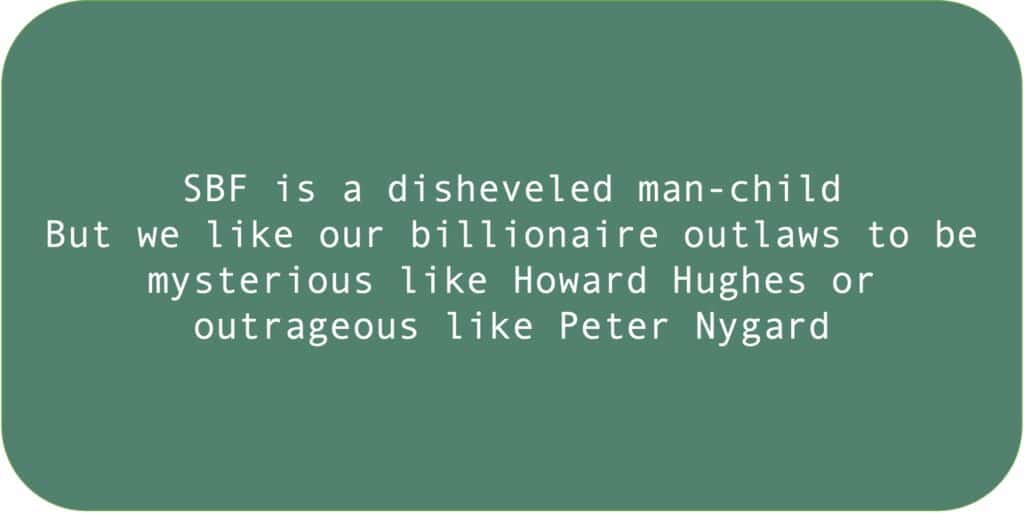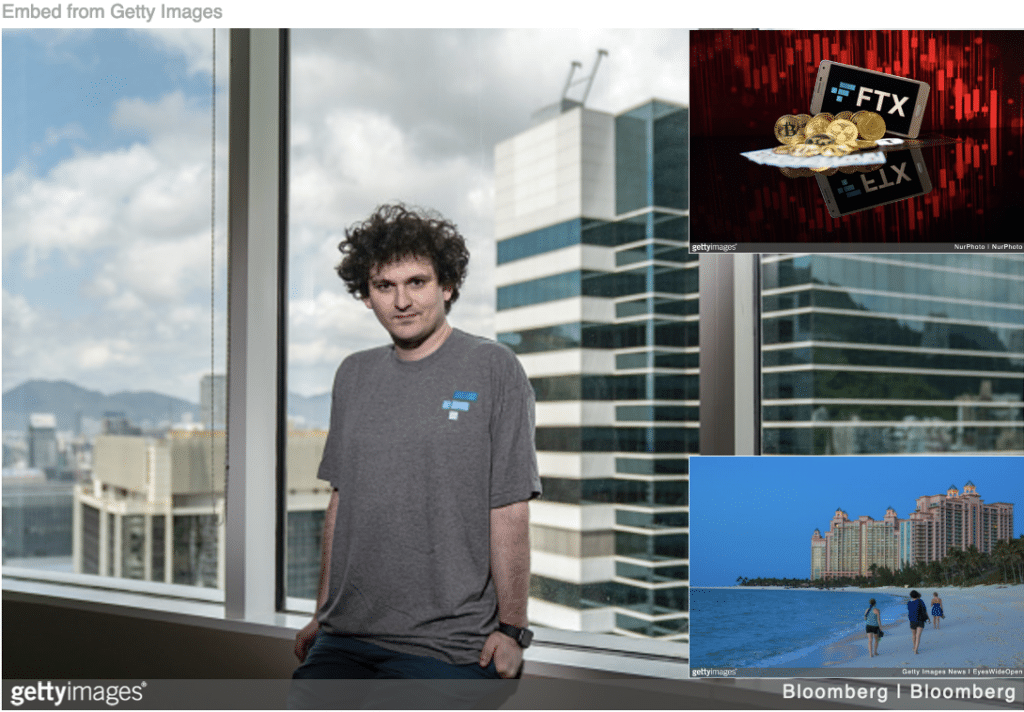
Elon Musk claims that, in March, Sam Bankman-Fried (SBF) tried to buy a stake in Twitter. And that it took him only minutes to figure out that SBF was all BS.
It took Bahamian authorities a little longer. They have just seized SBF’s Crypto assets. But they have not arrested him. One wonders what they’re waiting for.
SBF’s Ponzi Scheme collapses
In less than a week, the cryptocurrency billionaire Sam Bankman-Fried went from industry leader to industry villain, lost most of his fortune, saw his $32 billion company plunge into bankruptcy and became the target of investigations by the Securities and Exchange Commission and the Justice Department. …
The empire built by Mr. Bankman-Fried, who was once compared to titans of finance like John Pierpont Morgan and Warren Buffett, collapsed last week after a run on deposits left his crypto exchange, FTX, with an $8 billion shortfall, forcing the firm to file for bankruptcy.
(The New York Times, November 14, 2022)
That’s why Musk, now as “chief Twit,” tweeted on November 11 that SBF “set his BS meter off.” Of course, unlike Elon, I’m no genius. But even I read enough to publish the following on my Instagram page (@ipinions) on November 11 (i.e., three days before that Times report):
WTF! Sam Bankman-Fried turns out to be Crypto’s Elizabeth Holmes, and he’s tarnishing the good name of my home, The Bahamas, to boot! Simply seizing his remaining assets is not enough. Arrest him!
Why seize FTX assets, but not arrest SBF?
I cheered when Bahamian authorities seized what remained of FTX’s assets. My Instagram post explains why. And they deserved cheers, especially for standing up to the high-priced US lawyers trying to strong-arm them into letting US authorities seize control.
The Bahamian attorney general defended the island nation’s actions during the collapse of FTX Digital Markets Ltd. and urged patience while authorities investigate the embattled cryptocurrency exchange.
A fight over which FTX entity controls customer assets could influence how and when customers get money back and whether that path goes through a bankruptcy court in Delaware or a liquidation in the Bahamas.
(The Wall Street Journal, November 27, 2022)
Reports abound that the Bahamian government is colluding with SBF to protect FTX assets. Attorney General Ryan Pinder dismissed them as “fake news.” He insisted that local regulators merely exercised their primary and independent authority “to protect customers and creditors.”

However, conspicuously absent from his defensive statement was any mention of local authorities arresting SBF. That’s why Pinder seemed more concerned about controlling the spoils of SBF’s alleged crimes than charging him. And that’s putting the cart before the horse (or the donkey in this case).
Not to mention that arresting SBF is critical to protecting and preserving The Bahamas’s reputation as the ‘Switzerland of the Western Hemisphere.’
Could SBF’s actions cost The Bahamas, as Allen Stanford’s did Antigua?
It took precious little cash for billionaire fraudster Allen Stanford to get the entire government of Antigua in his pocket. Granted, SBF did not have time to corrupt “every corner of Bahamian life” the way Stanford did in Antigua.
But he had time enough to corrupt more than a few Bahamian officials. And they all know it’s only a matter of time before US authorities arrest him and force him to out them. That is, just as they arrested Stanford and forced him to out every Antiguan official he bribed.
It does not bode well for everyone from Prime Minister Brave Davis to island caterers that the Wall Street Journal is running headlines like this:
- Nassau Guardian Criticizes Bahamas Government For Rolling Out the Red Carpet to FTX
That report included the following:
‘The Bahamas is getting a black eye at every turn on this,’ one of the Bahamas’ largest newspapers, the Nassau Guardian, wrote in an editorial this week that criticized Mr. Davis’s embrace of FTX.
(The Wall Street Journal, November 25, 2022)
Granted, Davis accepting cash or special favors from SBF is not nearly as corrupt and compromising as founding PM Lynden Pindling accepting cash and special favors from fugitive financier Robert Vesco or, God forbid, drug lords.
In any case, Bahamian authorities have a vested interest in arresting, trying, convicting, and imprisoning SBF for a long time. Doing so would make him pay for the crimes he committed. But it would also prevent him from formally implicating them as willing beneficiaries of, if not accessories to, his crimes.
Finally, it might be interesting to know that the victims of Bernie Madoff’s Ponzi scheme recovered “large chunks of their principal”; whereas the 18,000 victims of Stanford’s “recovered practically nothing.”
I fear SBF’s victims will be more like Stanford’s than Madoff’s.